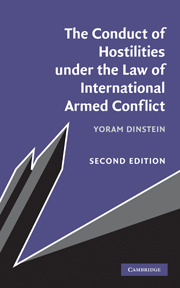Book contents
- Frontmatter
- Contents
- Introduction to the Second Edition
- Preface
- Table of cases
- Table of treaties
- List of abbreviations
- 1 The general framework
- 2 Lawful combatancy
- 3 Prohibited weapons
- 4 Lawful targets of attack
- 5 Protection from attack of civilians and civilian objects
- 6 Measures of special protection from attack
- 7 Protection of the environment
- 8 Specific methods of warfare
- 9 War crimes, orders, command responsibility and defences
- General conclusions
- Index of persons
- Index of subjects
9 - War crimes, orders, command responsibility and defences
- Frontmatter
- Contents
- Introduction to the Second Edition
- Preface
- Table of cases
- Table of treaties
- List of abbreviations
- 1 The general framework
- 2 Lawful combatancy
- 3 Prohibited weapons
- 4 Lawful targets of attack
- 5 Protection from attack of civilians and civilian objects
- 6 Measures of special protection from attack
- 7 Protection of the environment
- 8 Specific methods of warfare
- 9 War crimes, orders, command responsibility and defences
- General conclusions
- Index of persons
- Index of subjects
Summary
The definition of war crimes
657. War crimes constitute acts contrary to LOIAC giving rise to penal accountability of the individuals who perpetrated the proscribed acts. In the past, it was frequently contended that ‘[e]very violation of the law of war is a war crime’. But such assertions have never elicited support in actual State practice. As pointed out by H. Lauterpacht, ‘textbook writers and, occasionally, military manuals and official pronouncements have erred on the side of comprehensiveness’ in making ‘no attempt to distinguish between violations of the rules of warfare and war crimes’. It is now clear that only select, serious, violations of LOIAC are stigmatized as war crimes.
658. Each Belligerent Party bears State responsibility under international law for the conduct of all members of its armed forces: discipline, law and order must be maintained at all times. All members of the armed forces are subject to the military and criminal codes of the State that they serve, and in case of infraction they are liable to be prosecuted before domestic military or civil courts. As the four 1949 Geneva Conventions lay down, Contracting Parties ‘undertake to enact any legislation necessary to provide effective penal sanctions for persons committing, or ordering to be committed, any of the grave breaches’ defined in the Conventions. Yet, self-discipline by each Belligerent Party in war is not enough. Since time immemorial, international law has allowed other States – in particular, the enemy State(s) – to prosecute persons accused of war crimes.
- Type
- Chapter
- Information
- Publisher: Cambridge University PressPrint publication year: 2010



